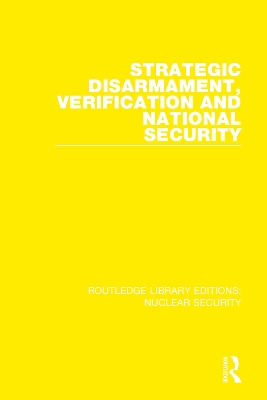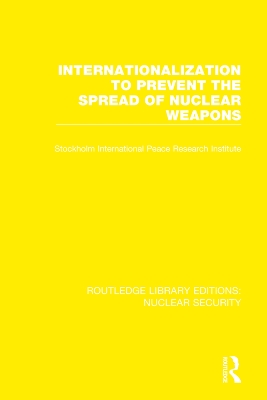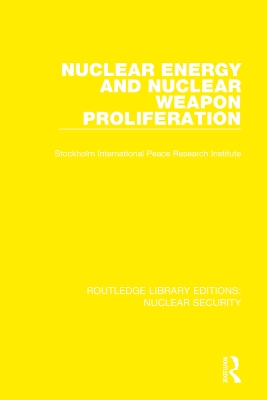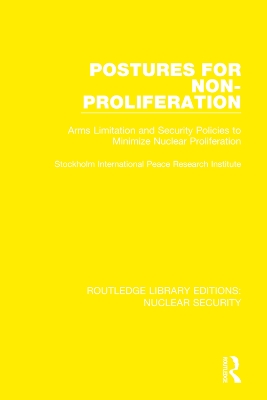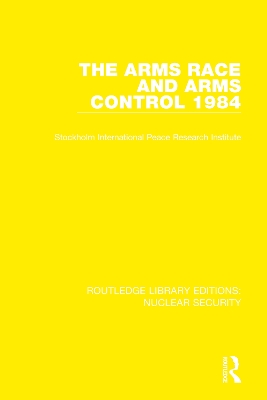Routledge Library Editions: Nuclear Security
5 total works
Strategic Disarmament, Verification and National Security
by Stockholm International Peace Research Institute
Originally published in 1977, the purpose of this book was to analyse the relationship between the security of two states mutually undergoing strategic disarmament at the time and the need for safeguarding their security by means of a verification system. The book thus studies some of the basic problems in the disarmament debate, issues that had been the subject of great political controversy.
Previous studies had been mainly descriptive or historical, lacking in objective political analysis, and tending to political bias, depending on the political school of the author. There was thus some justification for the statement made by some outstanding authorities in the field that 'to date, no systematic analysis has been attempted to determine what disarmament measures would optimally require of verification methods...' Our ambition is to respond to this criticism, at least so far as the strategic context of disarmament is concerned.
Chapter 1 introduces us to the enormous range of repercussions caused by a disarmament agreement. Chapter 2 examines the concept of verification, analysing the meaning of the term, presenting various definitions of what verification is and attempting to systematize the concept.
It has been noted on many occasions that the verification set up in a disarmament treaty is only one of a number of factors working towards compliance with a treaty. In fact the role of verification in presenting the treaty, and therefore the security of its participants, is to a large extent limited. However, without many other conditions being satisfied verification on its own can do little to preserve the treaty regime. Chapter 3 discusses these conditions. Chapter 4 gives a brief analysis of the concept of national interests in general, and the concept of national security in particular.
Among all the elements of 'security', it is military security that plays by far the largest role. Because of this. Chapter 5 considers a specific case of strategic military security, in which security, defined as stable strategic deterrence between two states, is analysed.
Finally, Chapter 6 analyses the question of what happens to security based on strategic deterrence when states enter into the disarmament process. More specifically, the role of verification in preserving security in such circumstances is analysed, thereby answering the main problem of the book. The supporting data for Chapter 6 is given in the Appendix.
Internationalization to Prevent the Spread of Nuclear Weapons
by Stockholm International Peace Research Institute
First published in 1980, the original blurb read:
In August - September 1980 the second Review Conference of the Non-Proliferation Treaty (NPT) will take place in Geneva. As this Treaty is the most important barrier to the proliferation of nuclear weapons, the results of the Conference will obviously have major effects in the field of arms control and disarmament.
The implications of the recent International Nuclear Fuel Cycle Evaluation (INFCE) are that the technological capabilities of many countries are such that there is no technical solution to the problem of the spread of nuclear weapons to countries that do not now have them. Thus, it appears that if there is a solution at all, it must be political in nature.
A possible element in such a political solution is the internationalization of the sensitive parts of the nuclear fuel cycle; that is, those parts that have the potential of producing fissile materials to make nuclear weapons. Although the intricacies of a system of internationalization are still unresolved, the concept, if realized, would provide another powerful political barrier to nuclear weapon proliferation - a reinforcement for the aims of the NPT itself.
Against this background, and as a follow-up to its first symposium and the resultant book, Nuclear Energy and Nuclear Weapon Proliferation, SIPRI convened a second international group of experts to continue its discussions of issues pertinent to the forthcoming NPT Review Conference. The meeting took place at SIPRI in Stockholm, 31 October - 2 November 1979, when the feasibility of internationalizing the nuclear fuel cycle was examined.
SIPRI's views on this complex approach are expressed in Part 1 of this book - Internationalization to Prevent the Spread of Nuclear Weapons. Part 2 contains the papers that were presented at the symposium.
Nuclear Energy and Nuclear Weapon Proliferation
by Stockholm International Peace Research Institute
In mid-1980 a second conference for the review of the Non-Proliferation Treaty (NPT) would take place in Geneva. Given the importance of preventing, or at least slowing down, nuclear weapon proliferation, this conference would be a crucial event in the field of arms control and disarmament. For many countries the technical and economic barriers to proliferation had disappeared, and the only remaining barriers were political.
In an attempt to contribute to the discussions at the NPT Review Conference, SIPRI assembled a group of experts from a number of countries to discuss the technical aspects of the control of fissionable materials in non-military applications. The meeting took place in Stockholm, 12-16 October 1978. Originally published in 1979, this book on nuclear energy and nuclear weapon proliferation contains the papers presented at the symposium and reflects the discussions at the meeting.
Postures for Non-Proliferation
by Stockholm International Peace Research Institute
To constrain nuclear proliferation, one must, in addition to designing a proliferation-resistant nuclear fuel cycle, identify a set of long-term arms limitation and security policies for the major states. These policies should be capable of satisfying various security and political objectives of non-nuclear weapon states, thereby minimizing their incentives to acquire independent nuclear weapon capabilities, and thus collectively minimizing future nuclear proliferation. Originally published in 1979, this book attempts to identify such a comprehensive arms limitation and security regime. It reviews negotiations concerning the NPT through the end of the Review Conference of the NPT in mid-1975 and the subsequent strategic debate concerning nuclear proliferation.
The Arms Race and Arms Control 1984
by Stockholm International Peace Research Institute
For the third year running, this book, originally published in 1984, provided those actively concerned with the dangers of war at the time, with well-researched and up-to-date information on military developments of every kind.
Based on material published in the SIPRI Yearbook 1984, this book contains the essential data on nuclear issues, on military expenditure and the arms trade, and examines the breakdown of the arms control talks in 1983.
